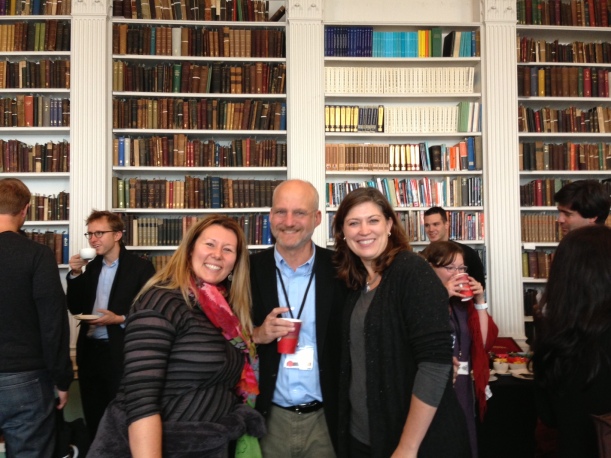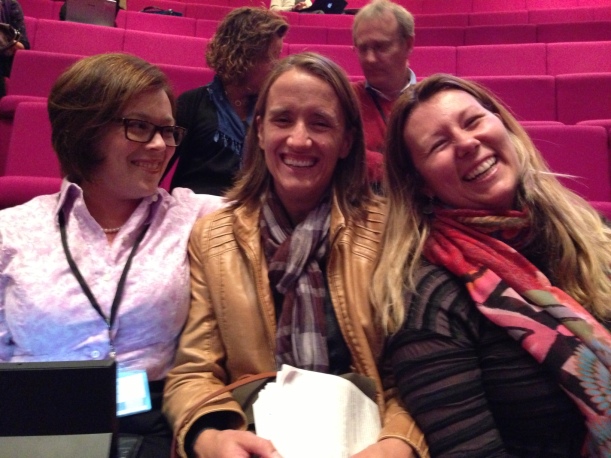Anthrodesign will be fifteen years old this year. I am fortunate to be part of such an intellectually stimulating, respectful, and engaged community. Over the years I’ve been asked many time about how the list came to be, and what the future might hold. If you’re interested, you can learn more on my professional blog. I would welcome your comments!
Author Archives: Natalie Hanson
Design Anthropology at AAA 2016
This year, the Annual Meeting of the American Anthropology Association was held in Minneapolis, MN. Our session on Design Anthropology was organized by Christine Miller and Emilie Hitch, and sponsored by the National Association for Practicing Anthropology (NAPA).
Some of the papers from this session are available below.
Design Anthropology: Discovery and Evidence of Emerging Pathways in Anthropology
Design anthropology is an emerging transdisciplinary field that brings together design’s fundamental orientation to change and critical anthropological perspectives in a radical approach to future-making characterized by “inclusive, collective, and public approaches” (Ehn, Nilsson, & Topgaard, 2014). Design anthropology is practiced in many different ways depending on the purpose of the study or project, the client, the composition of the research team, the context, and the community or “users” who are the subjects of the study. Design anthropology reflects a shift from stasis to process that extends the ethnographic gaze (Halse, 2013). This shift is at the heart of design anthropology practice and key to capturing the position of the anthropologist as both an observer of the transformative process while simultaneously being an active agent within it.
The diversity of design anthropology praxis is broadly evident in two main streams, one represented by the EPIC community (Ethnographic Praxis in Industry Conference) and the other as it has evolved in Europe and Scandinavia with strong ties to the tradition of participatory design. The EPIC community is rooted in business anthropology and strong business and corporate affiliations. The locus of design anthropology as it is evolving in Scandinavia and Europe tends to be centered in academic institutions, for example, The Royal Danish Academy of Fine Arts Schools of Architecture, Design and Conservation (KADK) which hosts the website of the Research Network for Design Anthropology (https://kadk.dk/en/research-network-design-anthropology).
In spite of this diversity, design anthropology embodies an emerging set of principles that define design anthropological practice. These principles include commitments to transdisciplinarity and collaborative process, participatory design that includes a wide range of stakeholders, ongoing methodological experimentation and design for social impact. Design anthropological projects are characterized by rigorous critique and iterations that take into account both intended and unintended consequences of proposed designed artifacts. The explicit aim, to achieve transdisciplinary collaboration, challenges team members to articulate and demonstrate how their individual contributions add value to the project. It requires thinking beyond disciplinary boundaries and subordinating individual disciplinary biases, focusing instead on the dynamics of whole systems and what other disciplinary perspectives can contribute and how they can add value.
Presenters will explore various forms and traditions of practice within design anthropology.
Conference presentations
- Innovation, Human Understanding, and Design in the Software Industry (Natalie Hanson, ZS)
- Change of Pace: Design Anthropology and Slowness in Process, Participation, and Production (Siobhan Gregory, Wayne State University)
- Bringing Back Holism – Anthropologists and Service Design (Tamara Hale, Effective UI)
- Design Anthropology’s Life, Death, and Rebirth in Postgraduate Programs (Dori Tunstall, Ontario University College of Art and Design)
- Money, Power, and Accountability: Reflections on Academic and Business Anthropology (Rebekah Park, ReD Associates)
- Designing Digital Archives for Endangered Languages (Christina Wasson, University of North Texas)
- Design Anthropology in Practice (Martha Cotton, Fjord)
We are in discussions about perhaps turning the presentations into a journal issue.
Assistant Professor, Dept of Anthropology
The New School for Social Research (NSSR) in NYC seeks to make a tenure-track appointment at the Assistant Professor level in the Department of Anthropology to begin Fall 2016. The ideal candidate will complement the department’s emphasis on interdisciplinarity, conceptually rigorous and ethnographically grounded scholarship, and innovative pedagogy.
Geographic area and subject specializations are open. We are looking for applicants with a research focus on urban social ecologies: this includes work on infrastructures, digital technologies and networks, zones of reconstruction or occupation, the politics of mobility and sustainability. We encourage applicants whose scholarly work and intellectual practice reach across theoretical and disciplinary divides and in particular we are looking for applicants motivated to play a role in developing and teaching in a new graduate program in design and anthropology being developed in conjunction with the school of design (Parsons).
The New School is committed to maintaining a diverse educational and creative community, a policy of equal opportunity in all its activities and programs, including employment. The University is engaged in a diversity initiative and we encourage individuals from groups underrepresented in U.S. higher education to apply. We do not discriminate on the basis of race, color, ethnicity, national or ethnic origin, citizenship status, religion, gender, gender identity, sexual orientation, age, disability, veteran or marital status.
Further details on the department, the role, and the submission deadline is available at the New School for Social Research website.
UX job openings (various locations)
Some of you may know that, I lead a User Experience team at ZS Associates. We’re a privately held, employed-owned professional services firm of about 4000 people, with offices around the world. I joined ZS four years ago to build the User Experience (UX) team in our Software Development group. We’ve made a good impact on our software solutions, and in the past few years I’ve expanded the team into our technology (consulting) practice.
The technology practice is an area of significant growth for us as a firm, and as a result, the UX consulting team is also growing rapidly. ZS provides a range of technology solutions for our clients, including a significant amount of work in analytics and data visualization. We are willing to invest in teaching the right candidates about data visualization, if we have evidence that other core UX skills are strong. We will also pay for relocation, if one of the locations below is enticing!
We expect prior experience in a comparable business setting, and a high degree of business acumen. At the Lead level, we expect candidates to be able to speak articulately about user-centered designs and a wide range of research and design services. You need to be able to scope and estimate projects, oversee both research and design efforts, and execute the work. If successful, there is significant opportunity to grow and manage a small team over time. If you are a researcher, you must be willing to engage deeply in the design work. Specifically, you must have experience translating user insights into interface requirements and design concepts; we would prefer a candidate who has experience bringing research through to information architecture and wireframes.
If this sounds of interest, please consider applying for one of the seven positions we have open at the moment. Note that Lead / Consultant level positions require 10+ years of experience, Associate Consultants require 3-8 years of experience, and the Associate positions are entry level (1-2 years of experience).
- In Northern California, we are hiring one Lead and one Associate Consultant.
- We are also hiring in Thousand Oaks (near LA, in Southern California) at the Associate Consultant level.
- We have two Associate Consultant level positions open in Philadelphia.
- We do also have one opening at the Lead level in our Software Development group, which is based in Evanston, Illinois (just north of Chicago).
The job descriptions are available here:
Senior User Experience Designer (Associate Consultant level)
User Experience Lead (Consultant level)
If you are interested in one of these positions, I’m happy to answer questions you may have about the roles or your qualifications before you apply. If you are ready to apply you can send an email to me (natalie dot hanson at zsassociates dot com).
We also have two Associate (entry-level) roles in Pune, India. For those you can contact me and I will put you in touch with our recruiter.
I hope to hear from a few of you soon!
Join us on Slack!
The Ethnography Matters, Anthrodesign, and EPIC teams have created a Slack channel for conversations about ethnographic methods. At Ethnography Hangout, we are an interdisciplinary group wearing many hats from design to tech and research, so you don’t need to have any formal background in ethnography to participate.
To us, creating a single Slack channel made a lot of sense to have our overlapping communities join into one place for conversations that extend beyond our own organizations and mailing lists.
We envision the Ethnography Hangout Slack to be a place for anyone to discuss applied ethnography. Those interested in discussion specifically grounded in the discipline of Anthropology can also check out American Anthropology Association (AAA)’s Slack.
Founded in 2002, Anthrodesign’s mailing list established a space for people working at the intersection of applied anthropology and design. Since 2005, EPIC has been promoting ethnography in organizations though the field’s premier annual conference, and more recently through an online community and professional resources. Launched in 2012, the Ethnography Matters blog has created publicly accessible content from people working in industry to academia at the cross section of technology and people. Despite having been formed at different times for different reasons, all three organizations are committed to a people-centric to organizations, products, and services, thereby expanding the field of applied ethnography.
To join the discussion on Slack , please fill out this form where we ask for some information about you and your work. Read our Slack guidelines. We look forward to seeing you on Slack!
For any question about joining Ethnography Hangout Slack, please contact the administrators:
- Natalie Hanson, AnthroDesign – ndhanthro at yahoo dot com
- Tricia Wang, Ethnography Matters – hi at triciawang dot com
- Jennifer Collier, EPIC – info at epicpeople dot org
EPIC 2013 in London
The Ethnographic Praxis in Industry Conference (EPIC) was held in London this year. You can follow the organizers on Twitter and/or read the Twitter stream (hashtags #epic2013, #epicsocial, #epicthd). There is also a Flickr site, though our pictures seem to be mixed in with an event at the Jewish Federation of NY, which makes for an interesting contrast. For a minute there I was thinking … were there really people in full-length gowns at the dinner and I just missed it?!
I just didn’t have it in me to do real-time blogging this year … and with the tragically limited wifi it was hard to even get a timely tweet out. But James Turner (@JamesAsterisk) did an amazing job real-timing blogging EPIC2013, so if you want to read a summary, that’s a great starting place! The draft proceedings may still be online, though they usually come down after the event. Though – bonus! – now the proceedings from years past are now available on the conference website.
It was great to be there and re-connect with members of the anthrodesign community! Here are a few pictures from our gathering at Bill’s in Soho. We had a good English breakfast with “bubble & squeak”. Don’t know what that is? It’s a hashbrown alternative made with mashed potato and peas. The British really seem to like their peas – I think they were in every single meal I ate in London!
If I had remembered to order gluten-free bread I would have finished everything on the plate!
Here is a picture of the chatty attendees:
At the end of the table is Elena O’Curry (Groupon), and going counter-clockwise from there is Nelle Steele (Microsoft), Alex (Pitney Bowes), Paul Klipp (independent), Todd Harple (Intel), Martha Cotton (GravityTank), Martin Ortlieb (Google), Sam Ladner (Microsoft), Steven Garcia (UNT), Erin Taylor (post-doc University of Lisbon), me (ZS Associates), and Gordon Baty (Gannett).
Also also a picture of me (right) in the library of the Royal Institution of Science with Tracey Lovejoy (EPIC co-founder) and Ed Leibow (now president of the American Anthropology Association).
And here is a picture of the lovely ladies of Microsoft (Sam Ladner, Nelle Steele, Tracey Lovejoy) sitting in the Faraday Theatre at the Royal Institute:
It was great to catch up with them and many more over the course of the conference …
EPIC 2014 will be at the Fordham University Business School in New York City – I hope to see you there!
Meetup in Singapore
List member Julien Cayla writes that he is moving to a new position in Singapore, at the Institute for Asian Consumer Insight, to teach ethnography and do research on consumer culture in South Asia.
He wants organize an informal get-together for people interested in cultural anthropology / ethnography / design / consumer culture in January in Singapore. The plan is to meet for drinks in the Central Business District. Email him if you are in the area and would like to connect with a group of like-minded anthrodesigners – julien cayla at gmail dot com.
Meetup in NYC
If you happen to be in NYC, please join us for the 2nd AnthroTech MeetUp on Thursday, 13th December, 7pm at the Pless Hall 1st floor lounge.
Max Foxman, a PhD candidate at Columbia University and a recent grad from NYU’s MCC program, will discuss his recent ethnographic and theoretical work on why people use gamified online products like Foursquare. He’ll also address his current work on people’s interaction with “Internet culture.”
April Strickland is a documentary filmmaker and a Ph.D. candidate in the Anthropology Department at New York University. She works with indigenous Maori film and television producers in New Zealand to investigate contemporary connections between media, sovereignty, and social movements.
We’ll also have audience Q&A time followed by freeform networking made more fun by the free wine that we’ll have for you! Please RSVP to organizer Uma Anand at http://www.meetup.com/AnthroTech-Anthropology-in-Technology/events/93347282/
Welcome!
We would welcome new participants in an online community that has formed to talk about anthropology and design. Members are interested in the role of applied anthropology in the corporate, public sector, and medical contexts. Not all participants are anthropologists, but all share the common interest of applying ethnographic techniques and social sciences theory to industrial, software, and other types of product and organizational design.
Since the group’s inception in 2002, Anthrodesign members have the opportunity to get to know each other via the listserv, social media, and face-to-face gatherings. If you have questions, you may contact list founder and moderator Natalie Hanson at ndhanthro at gmail dot com. If you would like to participate, instructions are on the Join Us page.





You must be logged in to post a comment.